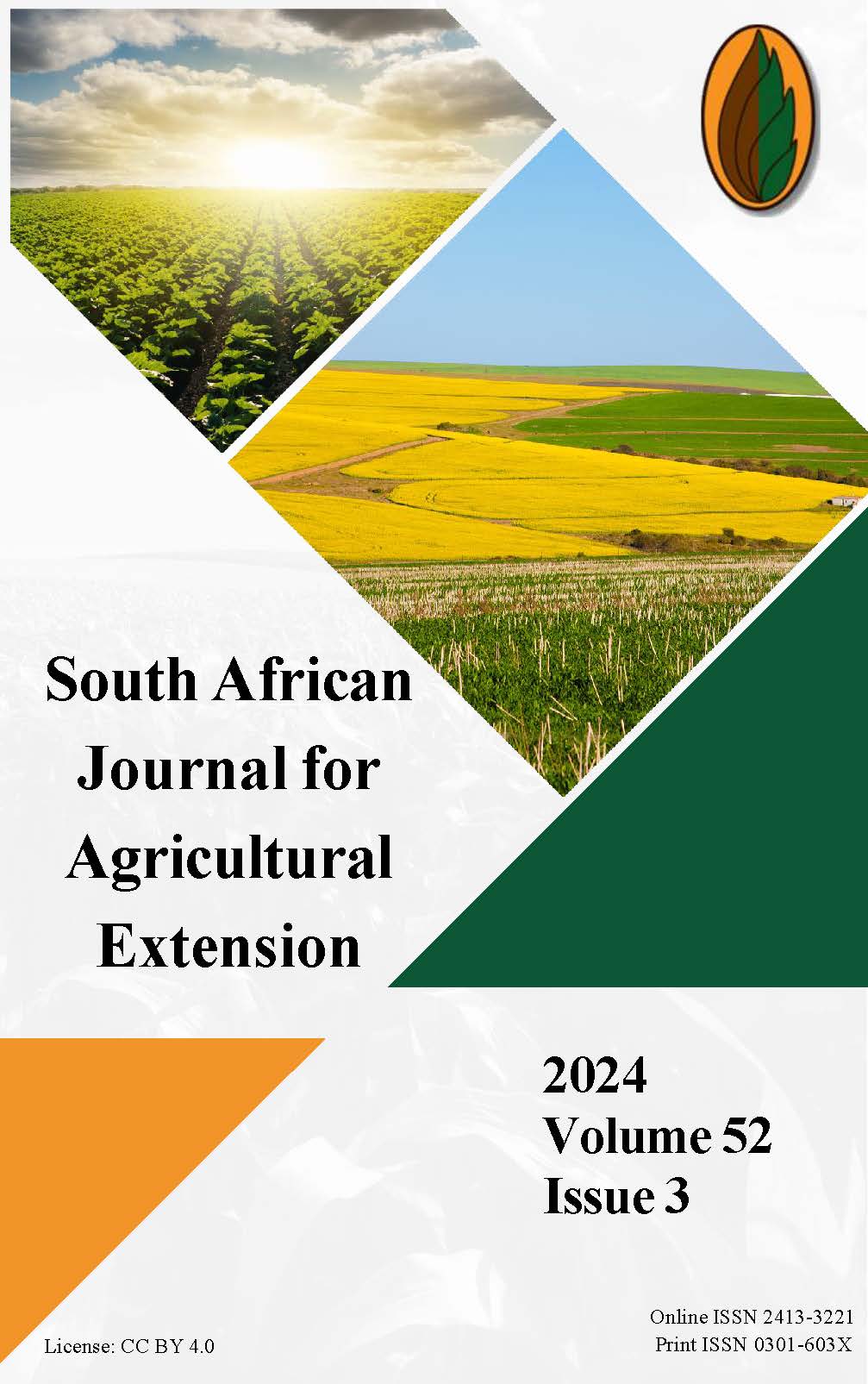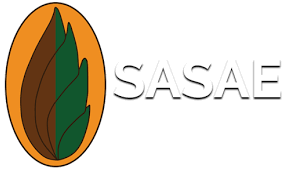Reimagining Decoloniality and Extension
DOI:
https://doi.org/10.17159/2413-3221/2024/v52n3a16141Keywords:
Extension, Decoloniality, Extension EducationAbstract
The language of change in curricula is increasingly being examined through the lens of decoloniality and Africanisation. This underscores the need to consider Extension education and the practice of extension within the context of contemporary post-colonial debates. This article examined decoloniality and its relevance in the practice of Extension education. To achieve this, the article adopted an interpretative qualitative analysis of relevant literature, documents, and research findings. The findings suggest that successful decolonisation calls for Extension curricula to be attentive to content challenges, the origin and foundation of which may be deeply rooted in the ideologies and logic of the global north. Additionally, the article highlighted the necessity for academics, researchers, and practitioners to prioritise local knowledge and methodologies. This means using a variety of solutions, regardless of their origin (African or Western), and adopting the most effective approach. These measures are essential for fostering effective development within the specific context of Extension Education and developmental needs.
Downloads
References
ASHCROFT, B., GRIFFITHS, G. & TIFFIN, H., 2003. Post-colonial studies: Key concepts. London, UK: Routledge.
BALFOUR, R.J., 2019. Foreword. In J. De Beer (ed.), The decolonisation of the curriculum project: The affordances of indigenous knowledge for self-directed learning. Cape Town: AOSIS, pp. xxxvii–xxxix.
BHAMBRA, G.K., 2009. Rethinking modernity: Postcolonialism and the sociological Imagination. Palgrave Macmillan.
BONYE, S.Z., ALFRED, K.B. & JASAW, G.S., 2012. Promoting community-based extension agents as an alternative approach to formal agricultural extension service delivery in Northern Ghana. Asian J. Rural Dev., 2(1): 76–95.
CABRAL, A., 1972. Identity and Dignity in the National Liberation Struggle. Africa Today., 19(4): 39-47.
CHILISA, B., 2012. Indigenous research methodologies. Los Angeles, CA: Sage.
CLARK, C., 2002. Effective multicultural curriculum transformation across disciplines. Multicult Perspect., 4(3): 37–46.
DAVIS, J.S., 2022. Decolonising South African Agriculture: Bringing dignity back to small-scale farming. Afr. J. Inter-Multidiscip. Sud., 4(1): 195-204.
DU BOIS, W.E.B., 1994. The souls of black folk. New York: Dover.
ESAKOV, H.J., 2009. Reading race: The curriculum as a site of transformation. S. Afr. J. High. Educ., 23(1): 69–82.
FANON, F., 1967. Towards the African revolution. New York, NY: Grove Press.
FOOD AND AGRICULTURE ORGANISATION (FAO)., 2022. Research and Extension. Available from: https://www.fao.org/research-extension-systems/eas/en/.
FREIRE, P., 1996. Pedagogy of the Oppressed. London: Penguin Publishers.
HABIB, A., 2021. Seeding a New World: Lessons from the FeesMustFall Movement for the Advancement of Social Justice. In J. Gluckler, H. Meyer & L. Suarsana (eds.), Knowledge and Space Series, Volume 17, pp. 275 – 290.
HODES, R., 2017. Questioning 'Fees Must Fall'. Afr. Aff., 116(462): 140–150.
HODGES, N.E., 1972. Neo-Colonialism: The New Rape of Africa. The Black Scholar., 3(5): 12–23.
JANSEN, J. & TAYLOR, N., 2003. Educational Change in South Africa 1994-2003: Case Studies in Large-Scale Education Reform. Geneva: World Bank.
JONES, G.E., 1981. The origins of agricultural advisory services in the nineteenth century. Soc. Bio. Human. Aff., 46(2): 89-106.
JONES, G.E. & GARFORTH, C., 1998. Chapter 1 - The history, development, and future of agricultural extension. In B.E. Swanson, R.P. Bentz & A.J. Sofranko (Eds.), Improving agricultural extension: A reference manual. FAO: Rome.
KEANE, M., KHUPE, C. & SEEHAWER, M., 2017. Decolonising methodology: Who Benefits from Indigenous Knowledge Research? Educ. Res. Soc. Change., 6(1): 12-24.
KHAN, M.H., 2001. Rural Poverty in Developing Countries. Implications for Public Policy. IMF. Economic Issues, No. 26.
LUIS-BROWN, D., 2008. Waves of Decolonization Discourses of Race and Hemispheric Citizenship in Cuba, Mexico, and the United States. USA: Duke University.
MAART, R., 2020. Decoloniality and Decolonial Education: South Africa and the World. University of KwaZulu Natal.
MALDONADO-TORRES, N., 2007. On coloniality of being: Contributions to the development of a concept. Cult. Stud., 240–270. https://doi.org/10.1080/09502380601162548.
MARINGIRA, G. & GUKURUME, S., 2017. Being black in #FeesMustFall and #FreeDecolonisedEducation: Student Protests at the University of the Western Cape. In M. Langa (ed.), #Hashtag: An analysis of the FeesMustFall Movement at South African universities. Johannesburg: Centre for the Study of Violence and Reconciliation.
MBEMBE, A., 2015. On the Post colony. California: University of California Press.
MIGNOLO, W.D., 2007. Delinking: The rhetoric of modernity, the logic of coloniality and the grammar of decoloniality. Cult. Stud., 21/2(3): 449–513.
MSILA, V., 2007. From apartheid education to the revised national curriculum statement: Pedagogy for identity formation and nation building in South Africa. Nord. J. Afr. Stud., 16(2): 146–160.
MSILA, V. & GUMBO, M.T., 2016. Africanising the curriculum: Indigenous perspectives and theories. Cape Town: African Sun Media.
NDLOVU-GATSHENI, S.J., 2013a. Coloniality of Power in Postcolonial Africa: Myths of Decolonization. Dakar: CODESRIA.
NDLOVU-GATSHENI, S.J., 2013b. Empire, Global Coloniality and African Subjectivity. New York and Oxford: Berghahn Books Press.
NGUGI WA THIONG'O., 1986. Decolonising the Mind: The Politics of Language in African Literature. Nairobi: Heinemann.
PEDREIRA, R., 1973. Return to the Source: Selected Speeches of Amílcar Cabral. New York: Monthly Review Press.
QUIJANO, A., 2000. Coloniality of power, eurocentrism and Latin America. Nepantla., 1(3): 533 – 580.
RAHMAN, M.S., 2017. The advantages and disadvantages of using qualitative and quantitative approaches and methods in language "testing and assessment" research: A literature review. J. Educ. Learn., 6(1): 102–112.
SHAY, S., 2015. Curriculum reform in higher education: A contested space. Teaching in Higher Education., 20(4): 431–441.
SMITH, L., 2012. Decolonising methodologies: Research and Indigenous peoples. Zed Books: London.
SWANSON, B.E., 2008. Global review of good agricultural extension and advisory service practices. Rome: Food and Agriculture Organisation of the United Nations.
WILDCAT, M., MCDONALD, M., IRLBACHER-FOX, S. & COULTHARD, G., 2014. Learning from the land: Indigenous land-based pedagogy and decolonisation. Decolonisation: Indigeneity. Educ. Soc., 3(3): I–XV.
ZAVALA, M., 2013. What do we mean by sdecolonising research strategies? Lessons from decolonising, Indigenous research projects in New Zealand and Latin America. Decolonisation: Indigeneity. Educ. Soc., 2(1): 55-71.
Downloads
Published
Issue
Section
License
Copyright (c) 2024 M.C. Sayeed

This work is licensed under a Creative Commons Attribution 4.0 International License.








.png)